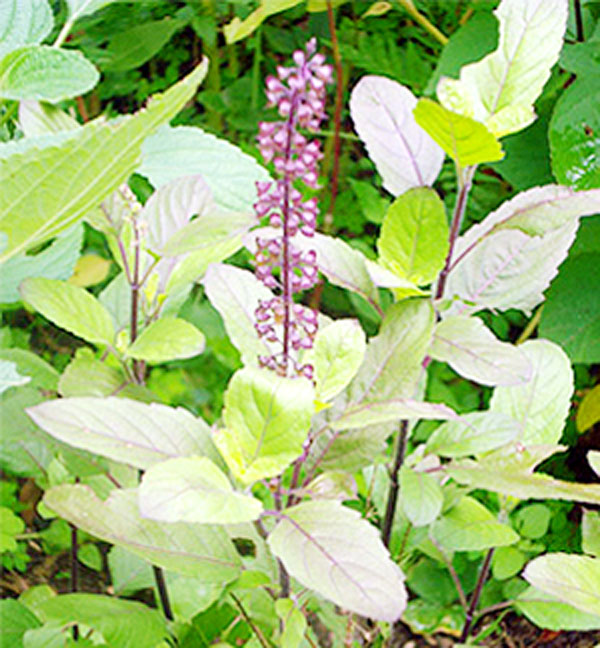Shahnaz Husain
Tulsi (Holy Basil) has so many medicinal uses that it has been traditionally venerated and worshipped in India. Modern research has revealed that it actually has several medicinal benefits, apart from helping to purify the air. It has been extensively used since the ancient times as a home remedy for common ailments. Basil has many healing properties and has been traditionally used to relieve cold and cough, sore throat and respiratory ailments. Tulsi leaves are crushed and taken with honey for cough, cold and bronchitis. It is also used as a digestive aid.
Tulsi is said to be rich in Vitamins A and C, as well as iron, calcium and zinc. It also contains antioxidants, which have many benefits, like keeping blood pressure, cholesterol levels and high blood sugar under control. Chewing a few tulsi leaves early in the morning is said to be most beneficial. However, if you are on blood pressure or blood sugar medication, please do not discontinue them without checking with your doctor. Being an antioxidant, it is said to prevent oxidation damage by free radicals and thus delays visible ageing signs. In fact, it is not only a powerful antioxidant, but is said to have anti-carcinogenic properties too. It is been found to control some cancers, like oral and breast cancer.
Tulsi is also said to reduce stress, due to a soothing effect on the nerves. Due to its anti-stress properties, it has been used to help people to quit smoking, as it reduces withdrawal symptoms. Chewing tulsi leaves helps to reduce the urge to smoke. Tulsi tea, taken daily, can also help. Recent research has also revealed that it is beneficial for the kidneys and helps to reduce uric acid levels in the blood. Thus, it is also said to prevent and relieve the problem of kidney stones. Ayurvedic prescriptions state that the juice of tulsi leaves, taken with honey daily for six months, helps to remove kidney stones.
We have used tulsi extensively to treat skin and scalp problems, like pimples, acne, rashes, dandruff and other eruptive conditions. It has powerful antiseptic and anti-inflammatory properties. It also has a cleansing effect and helps to remove toxins and wastes. It is also a powerful astringent and helps to close the powers and reduce oiliness of the skin. Thus it can be added to formulations that are astringent-toners.
Tulsi has many beauty benefits and has been used in skin and hair products. It helps in protecting and maintaining healthy skin and shiny hair. If you skin is very oily and prone to pimples and acne, use skin tonics containing tulsi (basil). You can crush tulsi leaves and add them to boiling water. Then allow it to stand for a few hours, so that the water cools. Strain the water. Add equal quantity of rose water to make your own skin lotion. Dip cotton wool pads and use it to wipe the face. The juice of tulsi leaves can also be applied locally for skin conditions, like ringworm and eczema.
Soak tulsi leaves in hot water overnight. Next morning, when it is cool, strain the water and make a paste of the leaves. Apply it on the face, or scalp for acne or scalp eruptions. Wash it off after 20 minutes with plain water. Tulsi paste can also be added to face packs for oily and pimple prone skin. Mix multani mitti, sandalwood paste, paste of tulsi leaves and rose water into a paste and apply on the face, avoiding the lips and area around eyes. Wash off after 20 minutes. It helps oily and pimple-prone skin. Gram flour (besan) with curd and tulsi leaf paste also makes a good cleansing pack. Dried and powdered tulsi leaves can also be added to facial scrubs to exfoliate the skin and make it glow.
Trending Now
E-Paper


